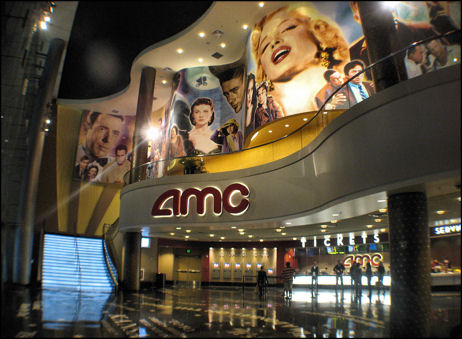
Main foyer of AMC Century City following this evening’s all-media screening of Bee Movie — Tuesday, 10.30.07, 9:20 pm

When this photo was taken in May 1972, Los Angeles was choking in smog (catalytic converters hadn’t been installed) and the traffic situation was considered to be pretty bad, especially during rush hours. Today, 35 years hence, traffic in this town is beyond any reasonable concept of toleration. I remember reading a news story in the mid ’90s that by 2010 the average driving speed in Los Angeles would be 11.2 miles an hour. That’s only two years hence. The situation feels pretty close to that now.
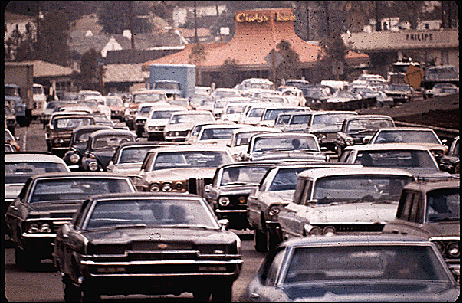
A drive that used to take 30 minutes in the early ’90s now takes at least 45 to 50 minutes, if not an hour. The only way to get around these days is to ride a scooter or a motorcycle. Otherwise you have to surrender to constant confinement. Cars are like little isolation cells that people ride around in, talking on their phones and listening to NPR and podcasts and getting more and more frosty and burrowing deeper and deeper into their ticks and fears.
A friend recently passed along an observation from screenwriter and longtime Los Angeleno Robert Towne to the effect that L.A. will soon be a town of absolute gridlock, and that during high-traffic hours the travel time from, say, the Pacific Palisades to downtown will eventually take just as long as it used to in the pre-World War I horse-and-buggy days. In this town and in this respect, cars have completely cancelled out their value in terms of speed. Ten years from now it’ll be almost like Blade Runner.
The only thing to do in L.A. these days is to stay indoors and not go anywhere, ever, unless it’s after 10 pm and before daybreak. It’s a city choking on itself. Travelling from Brooklyn to Manhattan and back on the subway is a much faster proposition these days. If I could clap my hands and move to Manhattan into a comparable space without the grief, I would clap my hands.
I’d love to know what the one-paragraph synopsis is for Terrence Malick‘s Tree of Life project, if anyone knows and wants to share. Getting a copy of the script would be even better. Heath Ledger and Sean Penn are said to be in talks to star and costar, respectively. River Road Entertainment’s Bill Pohlad will produce with Sarah Green, who helped produce Malick’s The New World.
Does that title scare anyone besides myself? Any title that ends with the words “of life” carries a potential for big trouble. Fountain of Life, Hot Dog of Life, Vacuum Cleaner of Life…they all stink. I’m especially concerned with a suggestion in Gregg Goldstein‘s Hollywood Reporter story that one-third of the film might take place in India.
In a “Big Picture” column piece based upon Marc Norman‘s “What Happens Next: A History of American Screenwriting,” a book that came out last week, L.A. TImes guy Patrick Goldstein says Norman “isn’t especially optimistic” about relations between screenwriters and studio execs over the coming years, primarily because “the old studio patriarchs have been replaced by executives who think they’re more in touch with the public taste than most writers.

As Norman puts it, “There’s now a generation of executives who wonder why the writer couldn’t be more like a court stenographer who can just put the executives’ ideas into writing,” says Goldtsein. Hey…wasn’t this precisely the attitude of Peter Gallagher‘s Larry Levy character in Robert Altman‘s The Player. Remember that creative-meeting scene when he asks an assistant to read stories from a newspaper at random, and Levy explains how each story could be a movie with the right attitude and ingredients?
I received Norman’s book in the mail the same day that Goldstein did, probably. I started to flip through it a couple of times but something always came up. How many hundreds of thousands of people regard the words “something came up” as the story of their lives?
Last Friday Variety‘s Todd McCarthy called Jerry Seinfeld‘s Bee Movie (Dreamamount, 11.2) “less than inspired… amiable but no more…short on surprise and originality…content with whimsical notions and mild jokes,” etc. The all-media crowd is finally having a looksee this evening and tomorrow night, myself included.
In his Hollywood Reporter review, Kirk Honeycutt said that “unfortunately, bees just aren’t that funny” and “they aren’t intriguing cartoon creatures. Nor is the odd story Seinfeld and his collaborators dreamed up very inspired. The film labors too hard for its comic moments and never discovers a cartoon logic that will allow bees and humans to interact.”
After all that hard work and all that hoopla at last May’s Cannes Film Festival with Seinfeld flying off the roof in his bee costume on a wire….jeez. The upside is that the family crowd is probably going to go for it big-time.
The best thing in Andrew Wagner‘s Starting Out in the Evening (Roadside, 11.23) is Frank Langella‘s performance as a sixtyish, once-great novelist named Leonard Schiller who’s retreated into a congealed, emotionally blocked-off place as a defense from the narcotized reality that his writing career has all but shrivelled up and died.
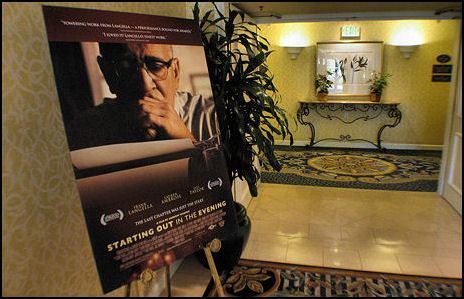
I can’t say I “liked” the character but I was moved by the undercurrents that Langella is able to suggest exist within. At first Schiller is a guy whose purpose in life seems to be to find new ways to be dull. Everything he says sounds slightly condescending and a little too pat. He dressed like a banker with a head cold. There’s no hint of any kind of a Manhattan iconoclast in him whatsoever. At first I wanted to see him get hit by a cab or a bus, but I slowly began to care for the guy and relate to his fears and regrets.
The story is about Schiller feeling vaguely irritated, intrigued and then finally aroused by a graduate student (Lauren Ambrose) who tries to get to know him so she can write a senior thesis about his novels. Naturally, certain longings kick in, and this May-December, teacher-pupil relationship gradualy becomes…uhm, not quite sexual but something more than platonic. On top of which there’s Schiller’s 39 year-old daughter (Lili Taylor) and his being concerned about her search for a lasting relationship and the right man to father a child.
I’m especially excited about seeing Langella’s performance as Richard Nixon in Ron Howard‘s movie of Frost/Nixon, which will be out sometime next fall. Langella is just now starting work on Richard Kelly‘s The Box, which is shooting in Boston. He’s a very good and bright fellow and an immensely respected actor. He used to live in my home town of Wilton, Connecticut, in the early to mid ’70s .
Here’s an mp3 of a chat I had with Langella last week on Friday, 10.19, at the Four Seasons hotel in Beverly Hills.
In an interview with Control star Sam Riley, L.A. Times/Envelope guy Mark Olsen says, “I hate to bring this up, but the fact that you and Alexandra Maria Lara, who plays Ian’s mistress Annik Honore, are now a couple in real life, in a strange way, puts a positive, romantic ending on a story that doesn’t have a lot of uplift.”
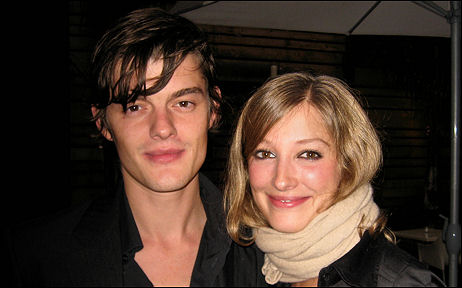
To which Riley responds,. “From what I’ve heard from Anton [Corbijn], Annik, the real Annik, is very moved by the fact we’re a couple. I think she likes the way that given a second time round — their story — there was a different outcome.”
The Criterion Collection’s DVD of Terrence Malick‘s Days of Heaven, one of the most visually breathtaking and exquisitely transferred films of the 21st Century, was released seven days ago. But you’d never know this landmark DVD even exists to go by Dave Kehr‘s N.Y. Times DVD column, which ignored its release last week and again today.
In today’s column Kehr writes about Anchor Bay’s Mario Bava collection and Warner Home Video’s Barbara Stanwyck Signature Collection; last week he wrote about a DVD of Sergei Eisenstein‘s Battleship Potemkin, a Criterion DVD of Jean Luc Godard‘s Breathless and Warner Home Video’s Stanley Kubrick collection. Let no one ever say Kehr doesn’t have good taste, but to ignore the Days of Heaven DVD is a very strange call considering that in his original review for the Chicago Reader Kehr described it as “a film that hovers just beyond our grasp — mysterious, beautiful, and, very possibly, a masterpiece.”
When I say I hate “dumb comedies,” I’m referring to comedies that pander to the mentality (if that’s not too sophisticated a word to use in this context) of simian-level moviegoers who love films like Balls of Fury. But if a comedy conveys the attitude and world-view of characters who are really and truly idiotic (and can’t help it or don’t care that they’re so afflicted), then I collapse into helpless spasms. I love stupidity, but only the kind that’s earnest and convincing.
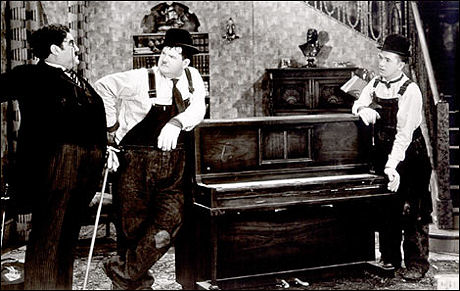
Parts of Dumb and Dumber are hilarious to me. Ditto Bill Pullman‘s “dumbest guy in the world” character in Ruthless People. I worship The Music Box, that classic Laurel and Hardy short about trying to deliver a piano in a big wooden crate. That moment in William Friedkin‘s The Brinks Job when Allen Garfield opens up a storage-room door at a gumball factory that a sign on the wall says to not open….hilarious.
My all-time favorite stupid line is in What’s Up, Tiger Lily? when that colorfully- dressed Oriental warlord shows Phil Moskowitz a small map and says, “Here is Shepard Wong‘s home” and Moskowitz replies, “He lives in that piece of paper?”
Please don’t list scenes that show run-of-the-mill stupidity. “Stupid” isn’t funny unless a character (or characters) really mean what they say. We’re talking about serious conviction, about dumbness that is solid and genuine…not affected or used as an “act.”
Memo from Universal marketing to American moviegoers: How would you like to see a sexy, sophisticated film about a smooth and tuxedoed Tom Hanks romancing the rich and super-fetching Julia Roberts over champagne and caviar while the man in the middle — the cerebral, schlumpy, moustachioed Phillip Seymour Hoffman — looks on apprehensively and wonders where the bathroom is so he can go take a leak while these two pitch woo as they conspire against the Soviet empire?
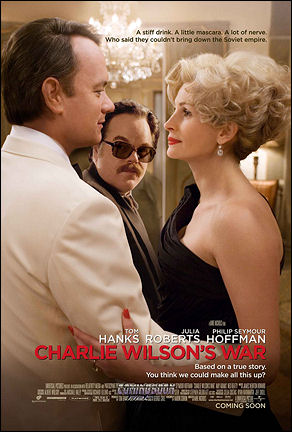
We’re just kidding about the Soviet empire, heh-heh. What Soviet empire….who, us? Why would we ever make a movie that has something to do with (cough, choke ) the Soviets? And please don’t believe any of those stories you might have read about Charlie Wilson’s War also being about….we can’t say it! And we won’t! Our movie is about three very light-hearted people having a grand old time being clever and clinking champagne glasses as they orchestrate deft political maneuvers.
We at Universal take the feelings of the American public seriously, and have therefore listened to and understood your determination to avoid Middle Eastern sand movies at all costs. Unlike certain online voices who’ve called you the “leave us alone!” ostrich brigade, we respect your wishes in this matter. Hence, our new one-sheet for Mike Nichols‘ Charlie Wilson’s War. Please come and see our film. We don’t want to die like all those other Middle Eastern sand movies. Please…not us.
Okay, it slipped out. Our film has something do with (we hate using this word) Afghanistan. We don’t like to admit it because we know you guys aren’t into fine distinctions. Our film is set in the early 1980s — 20 years give or take before 9/11 — and we know you guys won’t give a damn because you don’t read reviews or in-depth articles or go online to learn about this or that film. (Michael Cieply‘s 10.28 N.Y. Times piece saying that many American moviegoers might have trouble telling the difference between Grace is Gone and In The Valley of Elah was very persuasive in this respect.)
Oh, and apologies for forgetting to put a question mark at the end of the copy line that reads “who said they couldn’t bring down the Soviet empire.” We don’t like question marks. They make people feel….we don’t know, inconclusive. What do you care, right? If you don’t read reviews or go online to learn stuff, why should you care about correct punctuation?